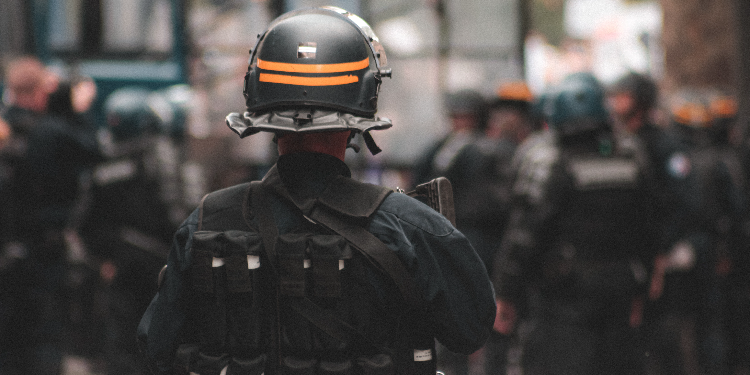
India and Myanmar have taken drastic measures following protests during the past few weeks. Expats, like locals, are currently faced with barricades on main roads, water cuts and internet blocks restricting access to telecommunication. Expats tell us about their experiences during these times.
The situation in India and Myanmar
Over the past weekend, thousands of police officers were deployed to different parts of India due to the farmers' protest against the government's agricultural reforms. This movement began on January 26 during the National Day celebrations. Furious farmers aboard their agricultural vehicles invaded the crowd during the military parade where hundreds of police officers were injured. The Indian government is, therefore being extra cautious. Ten metro stations were closed in New Delhi and checkpoints have been set up at the main crossroads.
In November, farmers demanded the cancellation of reforms aimed at liberalising the agricultural market. Protesters are threatening to pursue their action until October 2 if the government does not back off. The protest resulted in water and internet cuts as a sign of government pressure. Social networks were also blocked.
The Indian government claims that these measures are meant to "maintain public safety". Still, reactions came from worldwide, including celebrities, like Rihanna, the Swedish activist Greta Thunberg, the niece of the American vice-president Kamala Harris who is of Indian origin, and Jim Costa who is a Democratic member of the Foreign Affairs Committee of the American Congress. The Ministry of Information Technology ordered Twitter to block all content posted on its platform with the hashtag "#ModiPlanningFarmerGenocide". Although these accounts were subsequently unblocked, many consider this an attempt to hinder freedom of expression. India is, in fact, known for its oppression methods, ranking 142nd out of 180 countries in 2020 in the world index of press freedom produced by Reporters Without Borders.
But India wasn't the only country to block the internet and undermine the right to information and communication during the past few weeks. The coup in Myanmar also led to the blocking of social networks, such as Facebook, Twitter and Instagram. Today, Facebook is the primary source of information and communication in the country, especially for expatriates who are far from home and their loved ones. However, some Burmese used this tool to call for protests. When Facebook was blocked, they started posting on Twitter and Instagram which were also blocked.
The coup is the result of the home arrest of Aung San Suu Kyi, the leader of the National Party for Democracy (LND), who is accused of electoral fraud during the November 2020 elections. On Monday, February 8, the military junta was commented for the first time by the commander-in-chief, Min Aung Hlaing. He gave his guarantee that new elections will be and that power will be handed to the winner with due transparency. Many international bodies, including the United Nations and the American White House, warned Myanmar against potential sanctions.
What about expats?
The situation is quite delicate in Yangon, the economic capital of Myanmar which is also the place where most expatriates have settled. With telecommunications disrupted, many expatriates were unable to contact their dear ones to inquire about their safety or to reassure them. The internet block also resulted in limited access to information, thus creating panic among expats. When the internet was restored, many like Jennifer, an American expat in Yangon, were quick to request advice or share tips on social networks. “If you have to make international calls, Ooredoo is the best option. But make sure you have refilled your account as it is costly”.
Kelly, another American expat, advises expats to use Skype to contact their family overseas. “If social networks are blocked again, Skype is the only thing that will work. My dad, who is in the US, tried to contact me, but the call didn't go through, so we tried Skype, and it worked. Remember to give your local phone number to your dear ones ”. Others admit they use a VPN to bypass the internet block. "The only thing left for them to do is to completely block the internet," they say. Some are also calling for vigilance against misinformation. “In such times, it's difficult to stay up-to-date, so avoid spreading false news and spreading terror,” they warn.
On the other hand, Burmese citizens made calls for revolt to expatriates via social networks, particularly to those who have contacted their respective embassies for possible repatriation. Burmese expatriates are also threatening to protest abroad. However, expatriates in Myanmar prefer to stay on the safe side. “When we applied for a visa, we swore not to engage in politics. We can just talk about it, but participating in the demonstrations isn't even an issue for us. We don't want to be arrested or deported, ”says Jordan who is originally from the US.
Another expat adds that: “In 2007, Kenji Nagai was shot dead in broad daylight. I'm not sure they think about nationality before they eliminate people. Also, we all agreed not to indulge in politics during our stay. Yes, this is an exceptional circumstance, but the question of "foreign influence" has always been part of the military narrative. We can only exist here with the agreement not to engage in this sort of thing”.
As the situation worsens in Myanmar, Yangon International Airport and most banks will remain closed until further notice.



















